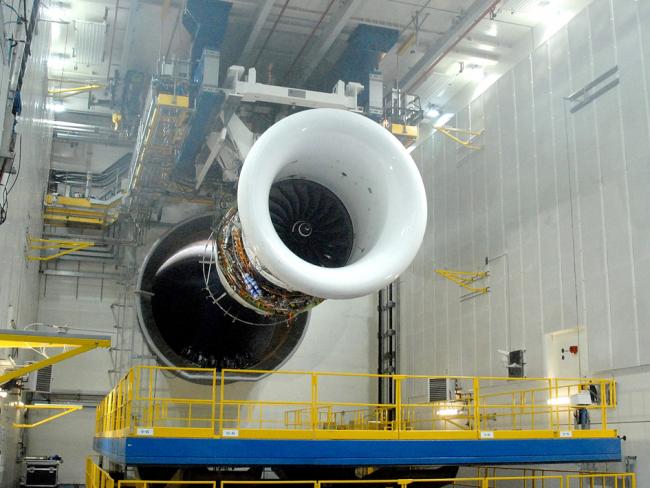9 June 2023

Trent turbofan under test at Rolls-Royce Derby, where it is currently testing UltraFan the next generation of efficient engine technology. Photo Cherry Salvesen, via Wikimedia Commons (CC BY-SA 3.0).
Workers at aerospace and defence company Rolls-Royce plc recently rejected the company’s pay offer in response to the workers’ cost of living claim made on 2 February this year. They are considering their next step in the face of obstructive tactics by the company.
The workers claimed a 6.5 per cent pay increase plus a £500 consolidated cash lump sum. They later included a 1 hour reduction in the working week. This was hailed by their unions, Unite and GMB, as fair and reasonable in the current inflation and industrial relations climate.
Messy
The offer, made after messy negotiations, was for a 6.5 per cent increase and a £500 unconsolidated cash lump sum with no reduction in hours. It went to a consultative ballot at the request of Rolls-Royce, which claimed that it could afford no more.
The ballot result announced on 3 May showed a decisive rejection by all four bargaining groups nationally – ranging from 97 per cent to 85 per cent. It seems Rolls-Royce workers feel strongly that the company can afford to meet the claim in full and are holding out on a relatively small part of the settlement.
Message
This sent a clear message to the company that the offer was an insult to those struggling to cope with the crippling rate of inflation. And it was after significant efforts by the union negotiating team to be positive and reasonable at all times.
To the workers this looks like a carbon copy of the 2022 pay round. The company dragged its feet, while telling the workforce that it was doing its utmost and the problem was union intransigence.
Bizarre
The company also made the bizarre claim to its workers that it does not have influence over how and what the union asks the members in the ballots that are held. These ballots are held in accordance with the restrictive law imposed on trade unions.
And in any case the ownership of democracy in independent trade unions rests with their members. They are not instruments of employers, whatever they or the government might wish.
‘The company says it wants to settle quickly– the reality is the opposite.’
The company said many times during negotiations that it wanted to settle quickly, but the reality is the opposite. Further negotiations with the Unite and GMB unions’ joint national bargaining groups ended in late May. That’s three months earlier than last year’s round; but worryingly events are unfolding on similar lines.
Divide & rule
As well as delaying agreement, Rolls-Royce is trying divide and rule tactics. It agreed deals cutting the working week from 37 to 35 with the submarine division in Britain and with certain sections of workforce in Germany (where inflation is currently lower than in Britain). But it has refused to agree a reduction in hours for all British employees.
Rolls-Royce will presumably hope to avoid industrial action by its British workforce. But by its negotiating stance and tactics, the company has driven them to reject the offer and consider industrial action.
The financial position of Rolls-Royce continues to improve. It posted better rates of improvement for the most recent quarter than many of its peer companies.
• Separately, unions are worried about the strategy of the new CEO, Tufan Erginbilgic. He has apparently appointed external consultants to look at organisational restructuring and transformation. But there is already the threat of job losses – 3,000 so far – although the company claims it hasn’t yet made a decision.
